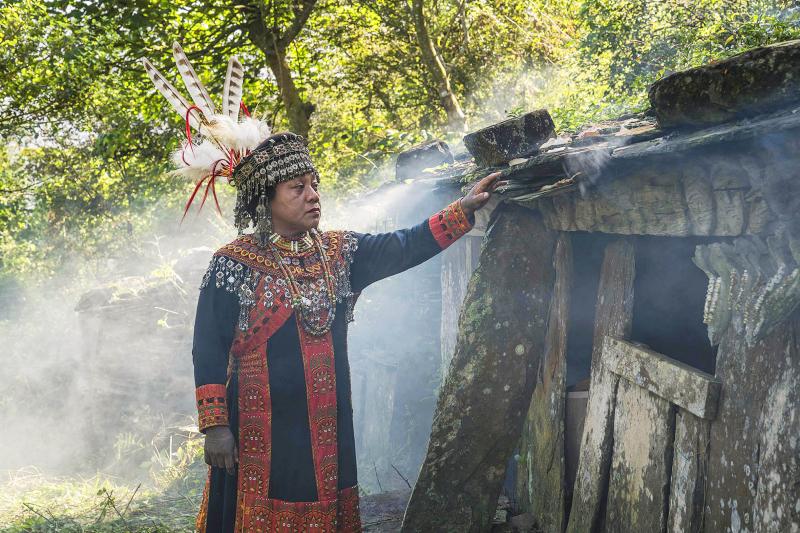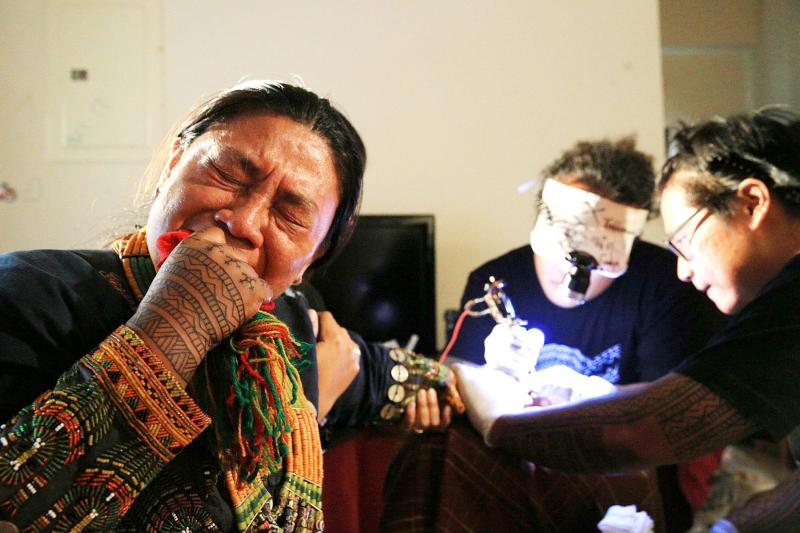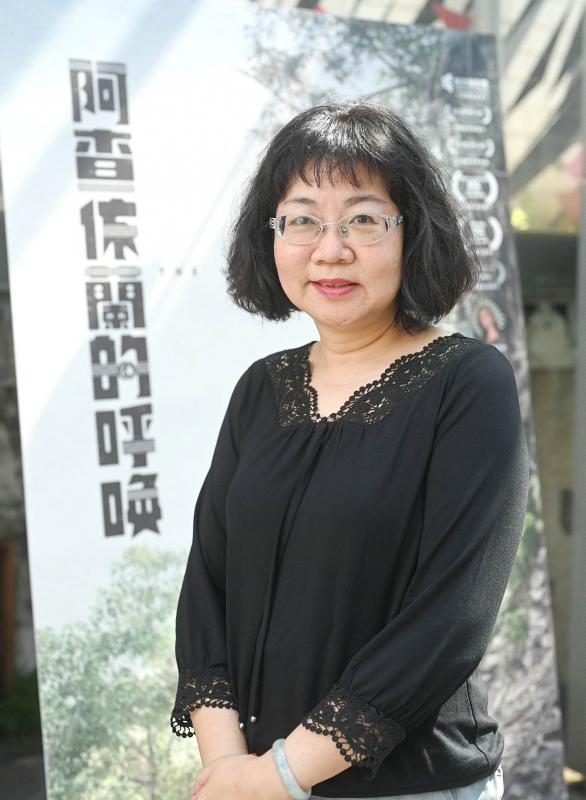Elaine Wei (魏郁蓁) didn’t stop filming when villagers called the police on her or threatened her over the phone. Nor did she shut the project down after her production company ran out of funds to travel to the filming location in Pingtung.
These challenges, and many others, seemed to end after she managed to get The Way Home: The Call of the Azangiljan (阿查依蘭的呼喚, a documentary that depicts the struggles of a Paiwan chief and single mother, into theaters through a crowdfunding campaign and government assistance.
Then, 10 days before opening night, Taipei raised its COVID-19 alert to level 3 and shuttered all movie theaters.

Photo courtesy of Activator Marketing Company
“It is what it is,” Wei says with a laugh during an online interview. “We’ll just have to face it.”
Wei will have to wait until the outbreak is over to negotiate a new screening date for the film, the protagonist for which, Dremedreman Azangiljan, never wanted to be a chief and spent years avoiding it. This, and her lack of knowledge about the Paiwan language and culture caused some in the village to resent her and challenge her title, which became the biggest obstacle to finishing the film.
“I always say that I’m just shooting Dremedreman’s personal story. The film isn’t out to explore who really should be the chief,” Wei says. “Her status is just the setting. What I want to tell is an encouraging story of a woman who is working hard to survive.”

Photo courtesy of Activator Marketing Company
UNEXPECTED CAREER
Wei, who worked most of her life in finance, never planned to be a director either. She was preparing to switch careers when her producer husband Hsu Kuo-yang (徐國揚) decided to launch a documentary studio and asked her to help out.
“I was like, ‘That’s crazy,’” Wei says. “I have a nice job where I’m pretty well-respected.”

Photo courtesy of Activator Marketing Company
But she eventually relented.
“I like learning new things, and I was actually interested in all the topics that were brought up, from ecology to culture to education. It’s very meaningful, and although it doesn’t bring in much money, I found myself unable to say no,” she says.
Wei attempted to go back to work when the production company was in dire financial straits, but she could no longer adjust to the strict environment.
“In the film industry, you can do and say whatever you want,” she says. “I never felt this in the past, but I was unable to express myself at all. That’s when I knew that there was no going back.”
As a former finance department manager, Wei found it difficult to admit that the production company was in debt, but over a decade later, especially with the fundraising and promotion that went into this film, she’s only recently been able to let go and open up.
The couple met Dremedreman while working on a project about the Austronesian peoples, which include all of Taiwan’s Aborigines. Wei found it intriguing that the Paiwan still have a class system — and that there was a female chief who couldn’t really speak Paiwan.
“Not only that, she’s a single mother with three children and she has a very lively personality,” Wei says. “She loves telling jokes. And she doesn’t hide her emotions at all. Someone like that is rare find for a documentary filmmaker.”
PORTRAYING CLASS AND CONFLICT
The Paiwan class system is hereditary, and as the oldest child, Dremedreman is first in line as chief. But due to her good grades, she left the village of Tjuwaqau at a young age and eventually became a nurse. When she turned 30, her father suddenly died. And then her husband asked for a divorce. She returned to her home village to start over, but life wasn’t that easy as not all the villagers were accepting of her, especially when she often had to leave to find work to support her children.
An argument between Dremedreman and an older relative broke out at a wedding during the early stages of filming, and after finding out the reason, Wei attempted to interview the ones who were opposed to Dremedreman’s status.
“They not only refused, they called the cops on us,” she says.
Wei and Hsu usually hired directors to helm their productions, but following this incident, they decided it was better to weather the risks themselves. They also thought that as a woman, Wei would be able to get closer to Dremedreman, and Wei was thrust into her first directing role.
Wei says a major dilemma was how much of the conflict to put in the film. She realized that she couldn’t tell a complete story without mentioning the dispute, but limited it to scenes that help explain Dremedreman’s story.
“For example, I include a scene where Dremedreman’s aunt was yelling at her for missing her daughter’s wedding,” Wei says. “That helps explain how desperate she was to escape the responsibility when she was younger.”
There’s a scene in the movie where the crew goes into the mountains with Dremedreman to look for hundred-pace vipers, and end up witnessing her speaking to her ancestral spirits. Wei says she had a supernatural experience then: suddenly, the colors of the hills changed and all the people around her had disappeared. The same thing happened again when they approached the ancestral spirit house in the old village.
Wei says as outsiders, it’s impossible to portray the complex Paiwan culture in one movie. They were fortunate enough to capture a colorful 10-day wedding, but the focus is still on the characters, events and storytelling.
“I see the wedding as a tiny, cursory introduction to Paiwan culture,” she says.

In the March 9 edition of the Taipei Times a piece by Ninon Godefroy ran with the headine “The quiet, gentle rhythm of Taiwan.” It started with the line “Taiwan is a small, humble place. There is no Eiffel Tower, no pyramids — no singular attraction that draws the world’s attention.” I laughed out loud at that. This was out of no disrespect for the author or the piece, which made some interesting analogies and good points about how both Din Tai Fung’s and Taiwan Semiconductor Manufacturing Co’s (TSMC, 台積電) meticulous attention to detail and quality are not quite up to

It is one of the more remarkable facts of Taiwan history that it was never occupied or claimed by any of the numerous kingdoms of southern China — Han or otherwise — that lay just across the water from it. None of their brilliant ministers ever discovered that Taiwan was a “core interest” of the state whose annexation was “inevitable.” As Paul Kua notes in an excellent monograph laying out how the Portuguese gave Taiwan the name “Formosa,” the first Europeans to express an interest in occupying Taiwan were the Spanish. Tonio Andrade in his seminal work, How Taiwan Became Chinese,

April 21 to April 27 Hsieh Er’s (謝娥) political fortunes were rising fast after she got out of jail and joined the Chinese Nationalist Party (KMT) in December 1945. Not only did she hold key positions in various committees, she was elected the only woman on the Taipei City Council and headed to Nanjing in 1946 as the sole Taiwanese female representative to the National Constituent Assembly. With the support of first lady Soong May-ling (宋美齡), she started the Taipei Women’s Association and Taiwan Provincial Women’s Association, where she

Mongolian influencer Anudari Daarya looks effortlessly glamorous and carefree in her social media posts — but the classically trained pianist’s road to acceptance as a transgender artist has been anything but easy. She is one of a growing number of Mongolian LGBTQ youth challenging stereotypes and fighting for acceptance through media representation in the socially conservative country. LGBTQ Mongolians often hide their identities from their employers and colleagues for fear of discrimination, with a survey by the non-profit LGBT Centre Mongolia showing that only 20 percent of people felt comfortable coming out at work. Daarya, 25, said she has faced discrimination since she